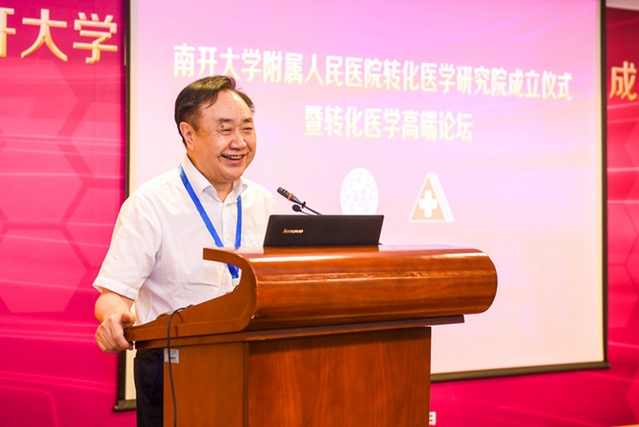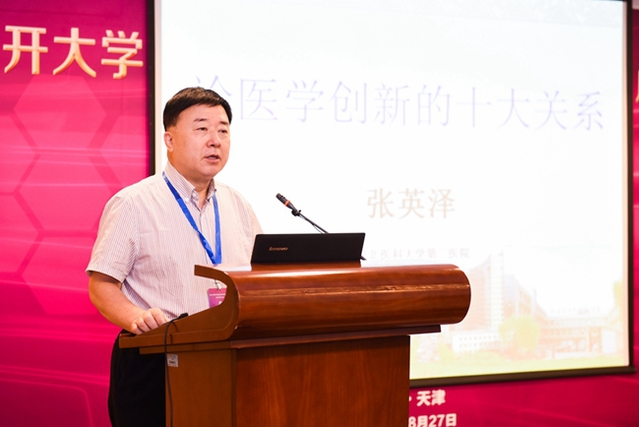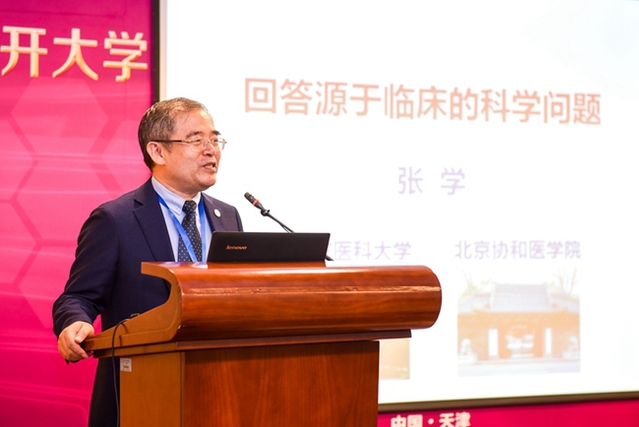Nankai University and Tianjin People’s Hospital Hosted a High-end Forum on Translational Medicine

On August 27, a high-end forum on translational medicine jointly hosted by Nankai University and Tianjin People’s Hospital was held in Tianjin People’s Hospital. Four academicians and many well-known experts and scholars from the Chinese Academy of Sciences, the PLA General Hospital, Peking University, Nankai University and other research institutes and universities attended the forum. At the opening ceremony, the Institute of Translational Medicine of the People’s Hospital Affiliated to Nankai University was also inaugurated.
Fan Daiming, academician of the Chinese Academy of Engineering, former vice president of the Chinese Academy of Engineering, and dean of the Department of Digestive Diseases at Xijing Hospital, FMMU, gave a report entitled “Reflection on the Development of Post-epidemic Medicine”. He pointed out that the unexpected COVID-19 pandemic has impacted global health, but also highlighted the importance of establishing an integrated health service system. Fan also pointed out that human life follows a non-linear path, therefore we must adopt diversified medical approaches in human life and health management. We must not only vigorously develop medical science and technology but also promote medicine advancement for human being.

Xu Jianguo, Academician of the Chinese Academy of Engineering, Director of the State Key Laboratory for Infectious Disease Prevention and Control of the Chinese Center for Disease Control and Prevention, Dean of Tianjin Joint Research Institute of Public Health and Dean of Nankai University Institute of Public Health, in his report “New Understandings about the Gut Flora of the Chinese Population”, introduced the latest results of his team’s research on the gut flora and proposed new understandings of how gut flora distributes within the body of the Chinese people. He pointed out that most current understandings of the human gut microbial community are still limited to the “genus” level, causing many wrong conclusions or opinions and misleading the public to some extent.
Xu’s team adopted the method of bacterial macrotaxonomy to analyze the fecal flora of 120 healthy Chinese from the “species” level, and obtained many new understandings of the Chinese gut flora. They found that among the detected 1235 “species-level” bacterial taxa, about 62.7% belong to unknown bacteria; according to the detection rate, the bacterial species can be divided into low-frequency, medium-frequency and high-frequency flora, and interestingly, none of the 116 bacterial species contained in the high frequency flora can be found in all populations. In addition, probiotics such as Bifidobacterium longum, with low distribution and abundance, are not the dominant gut flora.

Zhang Yingze, academician of the Chinese Academy of Engineering, joint-appointed academician of Nankai University and honorary dean of the Third Hospital of Hebei Medical University, explained the relation between elements such as environment, reference, observation, thinking, transformation and innovation in an easily-understood way in his report “On the Ten Major Relationships of Medical Innovation”. He also took Israel’s agricultural irrigation technology and four Chinese medical innovations at the “Nobel-winning” level as examples to illustrate that innovations, without exception, come from careful observation, bold thinking and serious practice. He also gave examples such as “learning from the idea ofAO bone coding to encode human blood vessels” and “protective membrane with vascular nerve and surgical incision marks” to describe how he put into practice “from observation to thinking and from reference to innovation”.

Zhang Xue, academician of the Chinese Academy of Engineering and president of Harbin Medical University, gave an academic report titled “Answering Scientific Questions Originating from Clinics”. He pointed out that elevating clinical needs to scientific questions is the fundamental guiding philosophy for clinicians during their research. Scientific research based on clinical problems is the best way to solve clinical needs and therefore has the greatest vitality.
At the forum, experts and scholars such as Jiang Baoguo, Dean of Peking University People’s Hospital, Han Weidong, Director of the Department of Biotherapy of PLA General Hospital, Wang Jiangyun, a researcher at the Institute of Biophysics of the Chinese Academy of Sciences, Liu Lin, a professor at the College of Life Sciences, Nankai University, and Yang Rongcun, a professor at School of Medicine of Nankai University, gave academic reports and exchanged opinions on topics such as the stratified treatment of COVID-19 severe illness and mathematical model of urban prevention and control, translational medicine in tumor immunotherapy, synthetic biology of gene codon expansion, analysis of the same single cell to reveal the heterogeneous telomere and transcription molecular characteristics of tumor stem cells, and intestinal microecology and human severe diseases.
(Reported by Li Zhang, Translated by Ziyu Wang, Photographyed by Qiqi Zong , Edited by Davide Francolino and JianjingYun)









